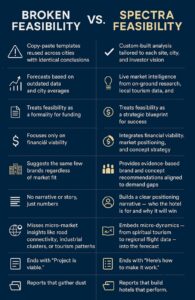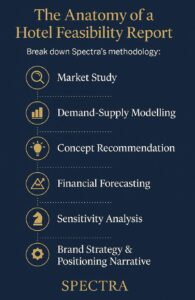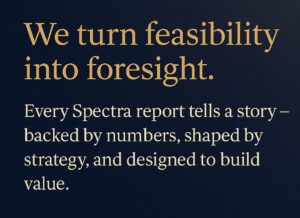Hotel Feasibility Studies in India Are Broken. Here’s How to Fix Them
A lot of things happen behind the curtains before glass façades and beautiful hotel buildings rise. No one is going to spend crores of rupees just on instinct. Behind every groundbreaking and ribbon-cutting moment lies months of due diligence, numbers, narratives, and nuance. Developers, investors, and brands rely on credible insights and authentic data to make decisions and commit to a competitive business like hospitality.
That’s where feasibility reports come in.
But here’s the problem, hotel feasibility reports in India are broken.
“Most hotel feasibility reports in India are nothing more than copy-paste PDFs. They look glossy, but they don’t build successful hotels. That’s why so many good projects fail before they even open.”
The Problem: Why Most Feasibilities Fail to Deliver
In 2024, the Indian hotel sector hit a milestone: branded hotel signings reached 33,407 keys across 333 properties, growing 45% year on year. Yet despite this boom, many projects falter before their opening. Why? Because feasibility reports are still too often treated as compliance checklists, not strategic tools.
Here are the recurring flaws:
- Unrealistic demand forecasts: Many consultants simply extrapolate past city-level growth or use generic average occupancy curves. They fail to adjust for recent shifts. For example, 77 % of branded signings in 2023–24 happened in Tier II & III cities, where demand dynamics differ sharply from metros.
- Ignoring the local ecosystem: Things like a new industrial park, a highway, or a pilgrimage route can alter demand dramatically, but many reports ignore them.
- Cookie-cutter brand mapping: The automatic assumption that a project “should be” a global brand dilutes differentiation.
- No positioning story or narrative: A report that doesn’t argue why this hotel should exist (versus competing hotels or unbranded options) ends up weak in tactical recommendations.
When the foundation is weak, downstream decisions — room mix, F&B, design, branding — become defensive rather than proactive.
The Impact: When Wrong Assumptions Cost Millions
The consequences of flawed feasibility are real and painful:
- Developers launch with an oversized or under-differentiated product that doesn’t match demand.
- Cash flows underperform; ROI is delayed, sometimes by years.
- Operators struggle because the hotel lacks a coherent identity.
- Cost overruns or repositioning exercises drain investor confidence.
Consider the aggregate growth. In 2024, India logged 42,071 branded hotel signings, up significantly from previous years. Interestingly, 77 % of those signings were in Tier II/III markets. Meanwhile, forecasts suggest that India’s total room count will swell to 4.1 million rooms by 2034, from 2.48 million in mid-2024. The window for growth is immense but only projects built with clarity and precision will thrive.
In short, the industry is expanding by quantity; the differentiator will be quality and sharp positioning. Feasibility reports must evolve or become irrelevant.
Spectra’s Approach: Feasibility That Builds Value (Not Vanity)
At Spectra Hospitality, our philosophy is simple: a feasibility report should not be buried in slides. It should be the strategic blueprint of your hotel. We add narrative, depth, and foresight to analytics.
Here’s how we do it differently:
- Financial Viability plus Brand Narrative
Yes, we run demand models, cash flows, sensitivity analyses. But we also build a positioning narrative, a “brand story” that guides what this hotel should be. That way, strategy and numbers are aligned. - Micro-Market Intelligence Over Macro Averages
We dive into site-level dynamics: new roads, local employment, tourist circuits, competition down the street. We capture the “unobvious” signals. - Concept Recommendations That Matter
Whether the site is better as a boutique resort, a business hotel, or hybrid mixed-use, our feasibility concludes with concepts, brand options, amenity mixes ,not just “propose a 120-key hotel.” - Scenario Stress-Testing & Pragmatism
We don’t promise perfection, but resilience. We test downside demand, rising costs, delayed openings and show investors what levers they can pull.
Because in India now, the difference between hitting your numbers and missing them often lies in the assumptions, not the discount rate.
Mini Case Studies: Feasibility That Found Its Fit
At Spectra, we believe that the most successful hotels are not those that follow trends, but those that fit perfectly into their micro-market. Every site has its own rhythm, its own unspoken demand patterns, and its own story waiting to be told. Our job is to find that fit.
Take Nagpur, for instance. It is a busy, competitive market where multiple national brands already crowd the mid-upscale space. The owner initially envisioned a high-end luxury hotel. Our feasibility analysis, however, revealed a different opportunity. Business travel and transient demand from the growing logistics and manufacturing sectors were driving weekday occupancy, while luxury demand remained thin. We recommended repositioning the project as a business + transit hotel with leaner room inventory, efficient space planning, and focused amenities like a quick-service F&B and co-working lounges. This pivot reduced capital cost by nearly 30 percent and improved projected return on investment projected within four years of opening.
Now look at Cuttack, a market often overshadowed by its neighbour Bhubaneswar. Most developers there were exploring traditional wedding or banquet-led hotels. Our field study and demand mapping showed rising interest in wellness and cultural tourism, with a steady inflow of domestic weekenders and NRIs seeking boutique experiences. We advised the client to develop a boutique wellness resort, smaller in scale, rich in storytelling, and positioned around wellness retreats and local cuisine. The feasibility showed higher ADR potential and year-round demand compared to the volatile wedding segment.
From the industrial belt of Guna in Madhya Pradesh, to the unknowns like Dhemaji in Assam, Spectra’s projects prove that context matters more than convention. Each market deserves a concept built for its own audience. Our in-house data models, on-ground validation, and advisory experience ensure that every report we deliver is not just feasible on paper, but sustainable in practice.
Feasibility that fits is what turns a plan into a performing asset. That’s what sets Spectra apart , “we don’t just analyse markets, we understand them”.
A Framework Developers Should Demand
Before accepting any feasibility report, every owner should ask three critical questions.
First, does it reflect the micro-reality of my location, or is it based on recycled city averages?
Second, does it articulate who my hotel is for, and why it will succeed? A spreadsheet without a positioning story cannot guide real decisions.
Third, does it lead to actionable outcomes, brand selection, design strategy, financial planning? If not, it is not a feasibility study, it is paperwork.
Redefining Feasibility for a New India
India’s hospitality market is expanding at historic speed. Operators are shifting from individual signings to multi-property development agreements, chasing scale and consistency. Nearly 81 percent of new branded signings in 2024 were under management contracts, signalling strong investor–operator alignment. This growth creates enormous opportunity but also raises the bar for diligence.
In this environment, Spectra Hospitality stands for a new era of feasibility, one that treats each market as unique, each owner as a partner, and each report as a living strategy document. We blend analytics with insight, and insight with imagination, to help developers build hotels that are not just feasible, but future-ready.
If you are planning a hotel in India, do not start with a report that collects dust. Start with one that builds value.
Spectra redefines feasibility for the new India, where every report doesn’t just prove viability, it creates vision.




